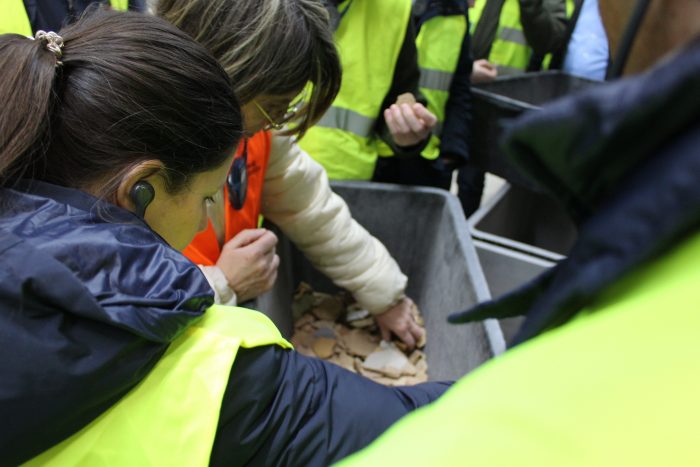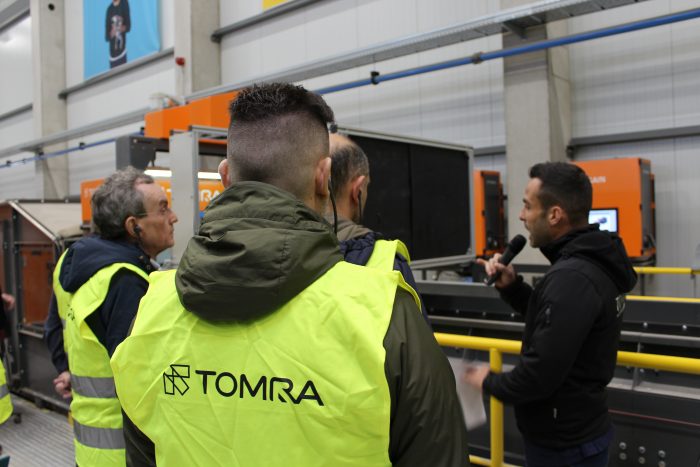EcoReFibre partners explore advanced wood sorting at TOMRA facilities

TOMRA Recycling’s headquarters hosted the testing hub for the European research project EcoReFibre on April 24. Following a one-day visit to TOMRA’s partner, DIEFFENBACHER, the project members journeyed to Mülheim-Kärlich, Germany, to observe the cutting-edge waste wood sorting technology provided by the leading provider of sensor-based sorting solutions.
How can wood fibers at the end of their lifecycle be efficiently reprocessed to create new fiberboard? EcoReFibre (“Ecological solutions for recovery of secondary materials from post-consumer fibreboards”), a research project involving twenty partner organizations across seven countries, has been tackling this challenging question since its inception in May 2022, backed by funding from the European Union.
For their recent project meeting, around 40 participants gathered amongst others at TOMRA’s facility in Mülheim-Kärlich, Germany. Though TOMRA is not an official member of the EcoReFibre consortium, the company was invited by its partner DIEFFENBACHER to conduct exclusive machine demonstrations for the EcoReFibre members, reinforcing the practical application of the research findings in sensor-based sorting.
Jose Matas, Director of the Wood Segment at TOMRA Recycling, said at the event: “TOMRA was the first to introduce deep learning sorting technology for waste wood recycling to the market. We are pleased that with our innovations we can not only contribute to the positive results of the EcoReFibre project but also advance the use of high-quality recycled wood fibers.”
Intelligent sorting using X-ray transmission and deep learning technology
During the event, there were three live demonstrations showcasing two sorting systems. The initial test centered on TOMRA’s X-TRACT™, renowned for its robust X-ray transmission technology (XRT), enabling the recovery of waste wood from intricate mixed streams. This sorting system identifies contaminants like inert materials, metals, plastic, and glass by atomic density, efficiently segregating them from the waste wood.
TOMRA experts conducted further tests on the AUTOSORT™ machine with its deep learning add-on GAINnext™, whose technology is the company’s latest artificial intelligence innovation and is capable of solving very complex sorting tasks. Matas further explains, “While our X-TRACT™ effectively separates contaminants from waste wood, GAINnext™ identifies objects by their shape, size, and visual characteristics, enabling it to differentiate between various types of wood or wood composites. GAINnext™ is trained using thousands of photos by our experts and it will continue to evolve with further training and future updates.”
During the second EcoReFibre demonstration, the intelligent sorting system recovered unprocessed wood, referred to as wood A, from the mixed wood fraction collected by the X-TRACT™. In the third and last step, GAINnext™ effectively sorted wood fibers from the processed wood B. The result is a clean fiberboard fraction with a purity that the EcoReFibre project participants were very pleased with.

Successful Two-Day Event
TOMRA was not the only company the EcoReFibre consortium visited during its research journey in Germany. On April 23, the members convened at DIEFFENBACHER’s headquarters in Eppingen to witness demonstrations of the company’s recycling machinery.
“In the first step, we shredded fiberboard into chip-sized pieces using our custom single-shaft shredder,” explains Jean-Christophe Zimmermann, Head of Sales of DIEFFENBACHER’s Recycling Business Unit. “These chips were then sized with the ClassiSizer to produce fines ideal for particleboard surface layers. The second part focused on fiberboard-to-fiberboard recycling, sorting waste wood into fines, chip-size, and oversize fractions with our ClassiScreen.” The chip-size material was set aside for TOMRA, while the fines were prepared for particleboard production.
Overall, participants provided overwhelmingly positive feedback over the two days. Stergios Adamopoulos, Professor of Wood Research and Technology at the Swedish University of Agricultural Sciences in Uppsala, leading the research consortium, affirms: “We’ve concluded two intensive days that have significantly advanced the EcoReFibre project with crucial insights. We’re grateful to TOMRA and DIEFFENBACHER. The event was a resounding success, meeting all key performance indicators, reaffirming our confidence in the direction of EcoReFibre.”
For more information, please visit: https://www.tomra.com/en/news-and-media
News Categories
- » NEWS HOME
- » Automation & Robotics
- » Industry 4.0
- » Material Handling
- » Sensors
- » Quality & Testing
- » Machine Vision
- » Laser & Optics
- » Metalworking
- » Motion Control & Drives
- » Hydraulics & Pneumatics
- » Process Industry
- » Renewable Energy
- » Agriculture
- » Home & Office Furniture
- » Environmental Tech









